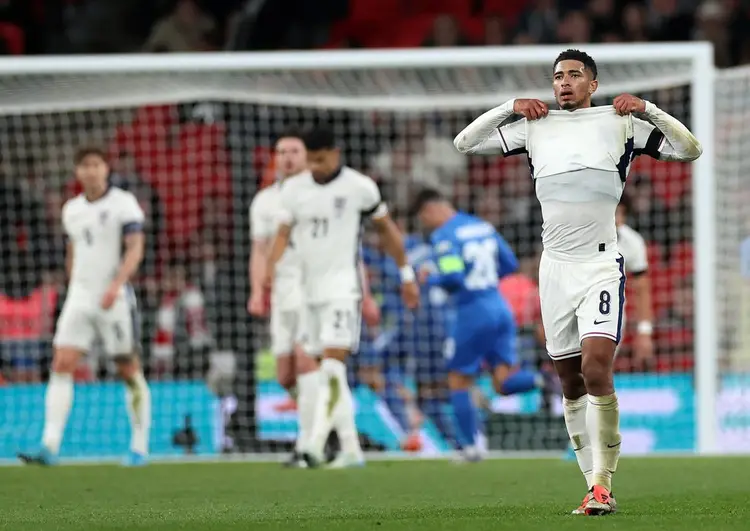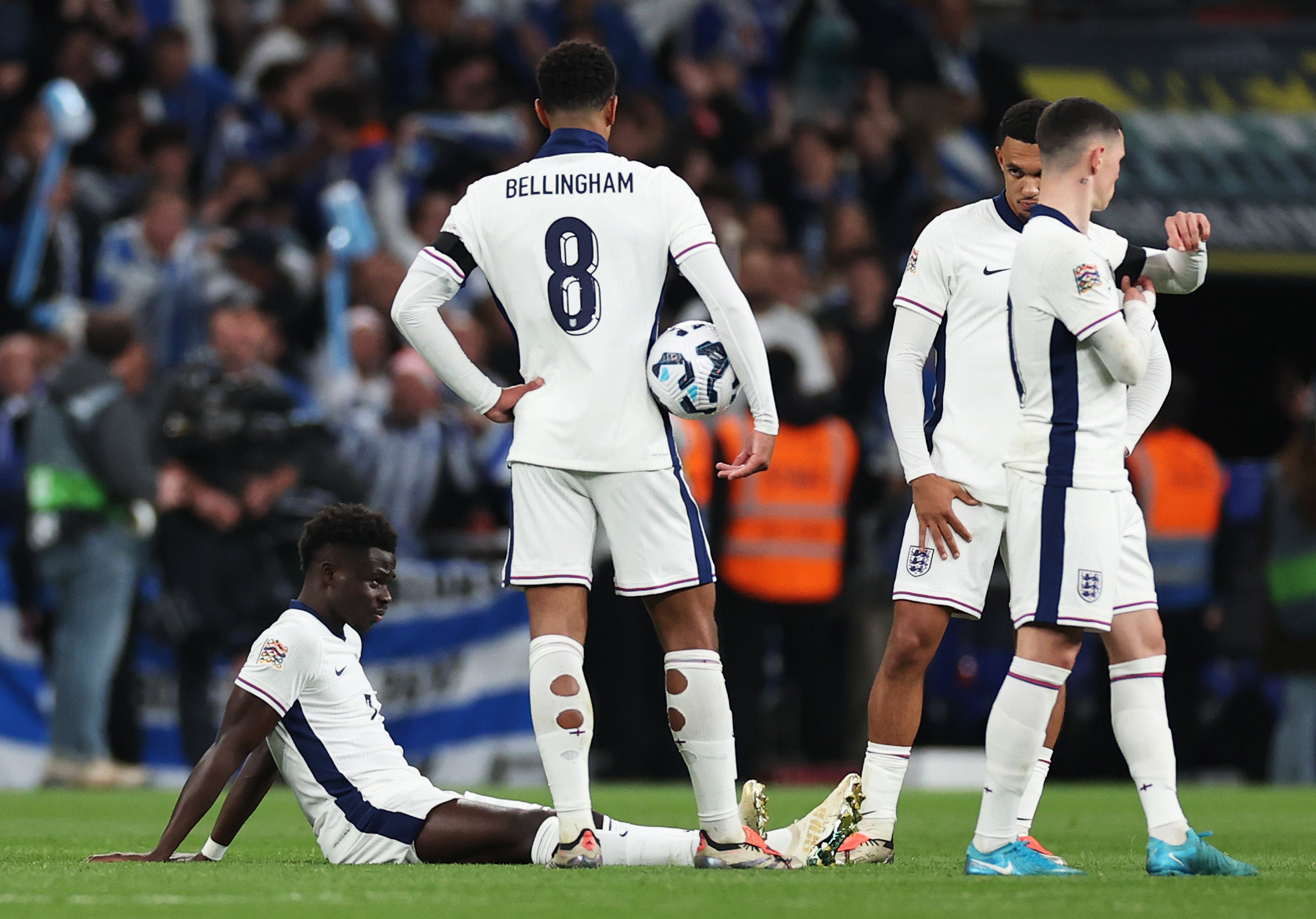England’s failed experiment gives one answer to Carsley - but asks another of him

Subscribe For Miguel Delaney’s Free Newsletter
Join Miguel Delaney's Free Weekly Newsletter
Subscribe To Miguel Delaney's Free Newsletter!
I would love to receive emails regarding promotions, events, and news from The Independent. Please take a look at our privacy policy.

An unsuccessful experiment is likely to spark the initial discussions about how to evaluate Lee Carsley's performance. The interim England manager stated that he wouldn’t label his tactical strategy for this first senior loss as a failure, yet he also mentioned it was an approach worth exploring. Despite not directly stating that he wanted the job permanently, his comments became so convoluted that he seemed to contradict himself.
There was a rather unfortunate moment when he expressed a wish to return to the under-21s, but that was likely only if he didn't get the senior position. It seemed like the pressure of the senior role was beginning to affect him for the first time. At times, his explanations were as muddled as his team formation. In contrast, Greece demonstrated a strong sense of purpose. Their 2-1 victory on the road was even more disappointing because the outstanding Vangelis Pavlidis scored both goals, highlighting for Carsley the importance of having a strong forward on a night where he made the historic decision to play without one.
A connection that stretches from Dixie Dean to Harry Kane has been disrupted, as a misleading striker is set to spark discussions about a deceptive new beginning.
Another interesting aspect of the evening was that Jude Bellingham netted England's sole goal, yet this was after he had been shifted back from his forward role due to a formation that clearly wasn't working. Carsley seemed to have his own strategy – it’s hard to label his approach otherwise – yet it appeared he was trying to cater to popular opinion by putting all of his standout players together on the field. Bellingham was at the helm of an unusual lineup that featured Cole Palmer, Phil Foden, and Bukayo Saka alongside him.
“It was a situation where I wanted to experiment a bit,” Carsley said later. “I’m willing to accept full responsibility for that. It was entirely my decision. I really considered how it would turn out and what the experience would be like. Unfortunately, it didn’t work out as planned this time... it most certainly didn’t. However, I believe we shouldn’t abandon the idea of trying new approaches in the future.”
However, there was still a familiar concern. This raises some alarm beyond just the choice of formation, especially since Carsley later mentioned that they had only practiced it for a brief 20 minutes. It’s reasonable for the manager to experiment with a new approach, and using a Nations League match—especially one where they had already claimed victory twice—seemed like an appropriate opportunity. However, it might have been better to face less challenging opponents than Greece. The Greek team showed great determination and were clearly motivated by the heartbreaking loss of former international George Baldock. Before diving into a discussion about tactics and techniques, it’s important to acknowledge how moving it was to see the Greek players with tears in their eyes as they celebrated Pavlidis’s goals.

However, those attacks didn't solely stem from the team's setup. They also highlighted a more troubling issue with Carsley’s squad: their vulnerability in the middle. In the early victories against Ireland and Finland, there were chances created against them, but Greece posed an even bigger challenge. “People expect us to be a strong team that will easily win against Greece at Wembley,” Carsley stated. “But we need to remember that the other team is highly motivated and will do everything they can to disrupt us.”
They were moving through England with such ease that it caused complete chaos in the defense, with skilled defenders finding themselves frantically attempting to kick the ball while lying on the ground. "I felt that all the goals were just mistakes," Carsley commented on his team's errors. It was telling that both of Pavlidis's goals appeared so alike, though each was finished off with the hallmark touch of a great striker.
It was quite impressive, particularly for a team and a coach known for their focus on strategy. However, the mood shifted quickly when Jordan Pickford mishandled the ball right away and struggled with a corner kick. Fortunately for him, Levi Colwill managed to clear the danger, and the offside flag saved them again. Still, Greece continued to press forward, clearly feeling they had an opportunity.
The reason for that was the poor performance of England's key players. Although it wasn't solely about the game formation, it's hard to ignore its impact.
The situation escalated to such an extent, with England showing a complete lack of control or balance, that it made one wonder if this was one of those tactical setups Jose Mourinho might use to make a statement. Will anyone ever question Carsley about his decision to include all the prominent attackers once more?
Most likely. It probably won't take long for the noise to begin if the first half isn't exciting, but we should keep in mind that this was only one match featuring these players and a specific strategy after just 20 minutes of practice. Carsley even mentioned that it’s something they might consider trying again later. He added, “I believed it was a innovative approach to our play... to have some of our attacking players on the field and see how that would unfold.”
The situation didn't seem favorable, with several longstanding issues evident. Foden and Bellingham repeatedly interfered with each other, reminiscent of their struggles from the summer. This occurred even though Bellingham was positioned differently, playing as a false nine. It wasn't surprising that he scored when he was shifted back to his usual position.
On the other hand, Palmer might be one of the most adaptable players in England, thanks to his skills and understanding of the game. However, assigning him to a midfield position seems unproductive. This choice highlighted a significant issue in England's performance, revealing a large void in the middle of the field and frequently between the forwards.
After years of criticism towards Southgate’s teams for lacking creativity, Carsley swung too far in the opposite direction. His squad needed the structure and organization that Southgate provided.
Carsley ultimately rolled it out, and it was somewhat ironic – and perhaps even somewhat sensible – that one of England’s most ambitious formations ended up resembling a classic 4-4-2 setup.
However, the team's defensive weaknesses were still evident. Greece managed a goal-line clearance, saw Pavlidis score the first goal, and had three other goals ruled out. All of these moments hinted that something significant was on the horizon, but it wasn't Carsley pulling off some clever move to take charge of the situation.
Instead, Greece took control of the night. In the 93rd minute, the same problems resurfaced, and the same striker found the net again. Greece earned this moment, and it raises important questions about whether Carsley should be considered for a position that seemed destined for him.









































